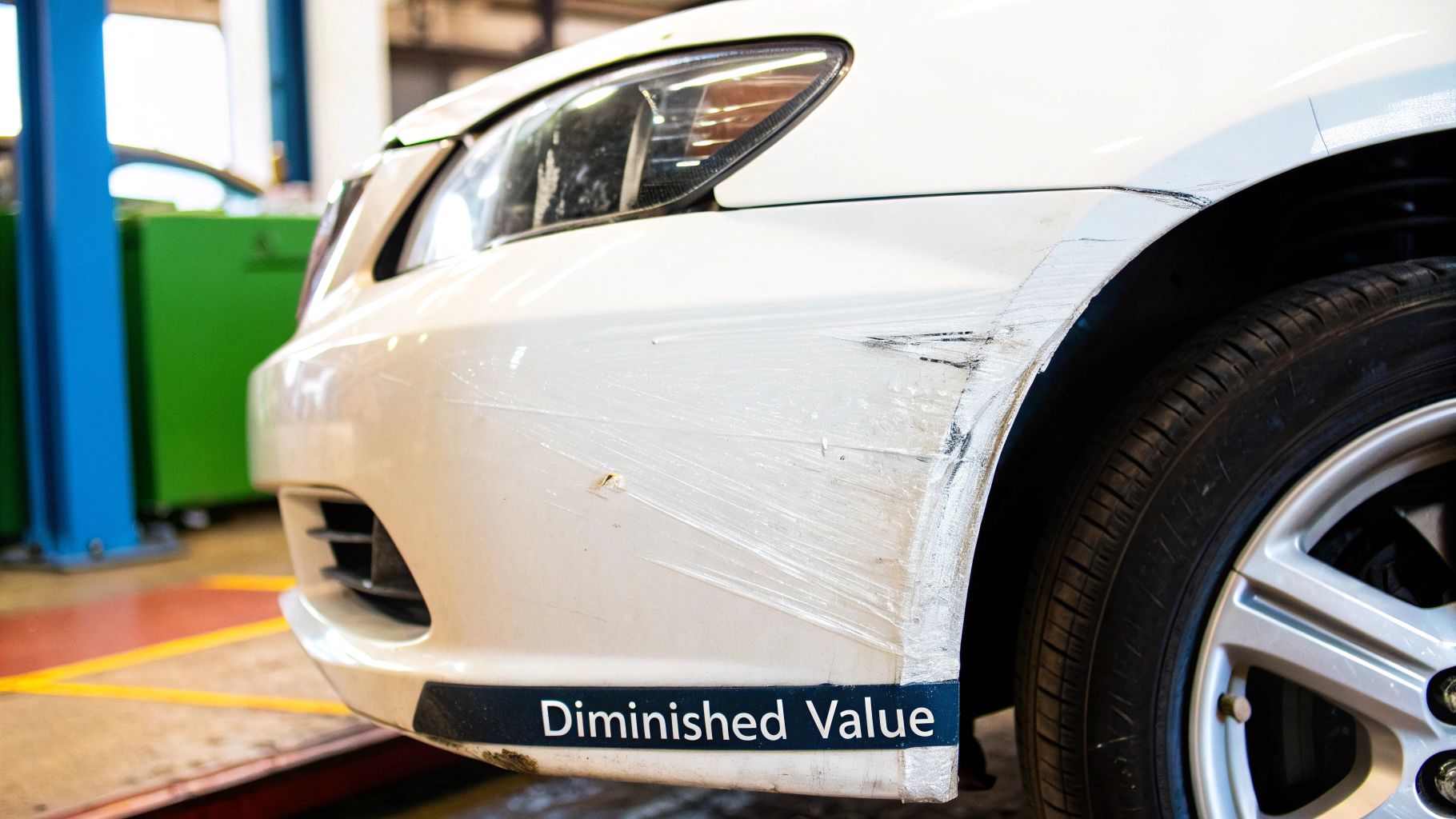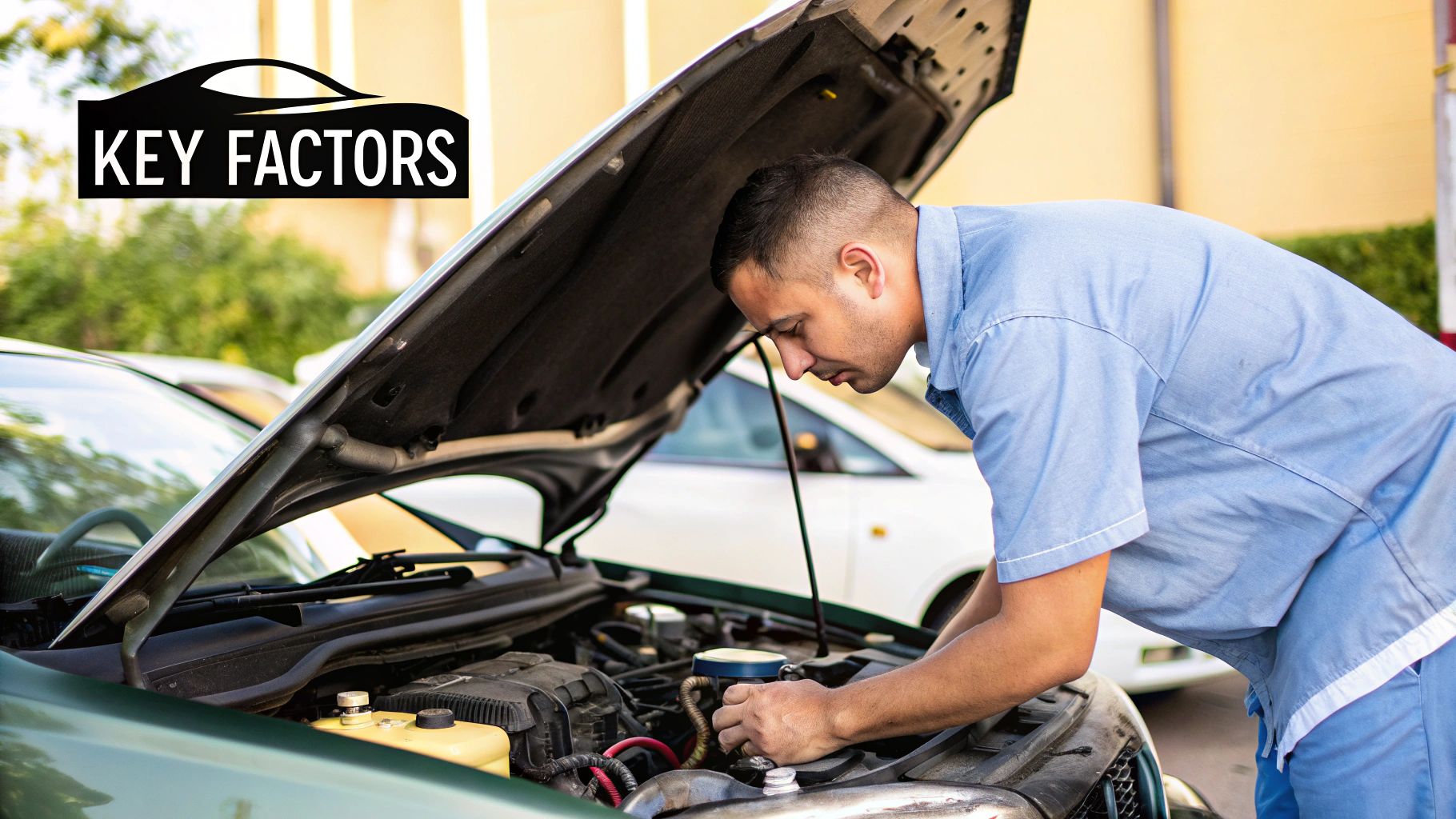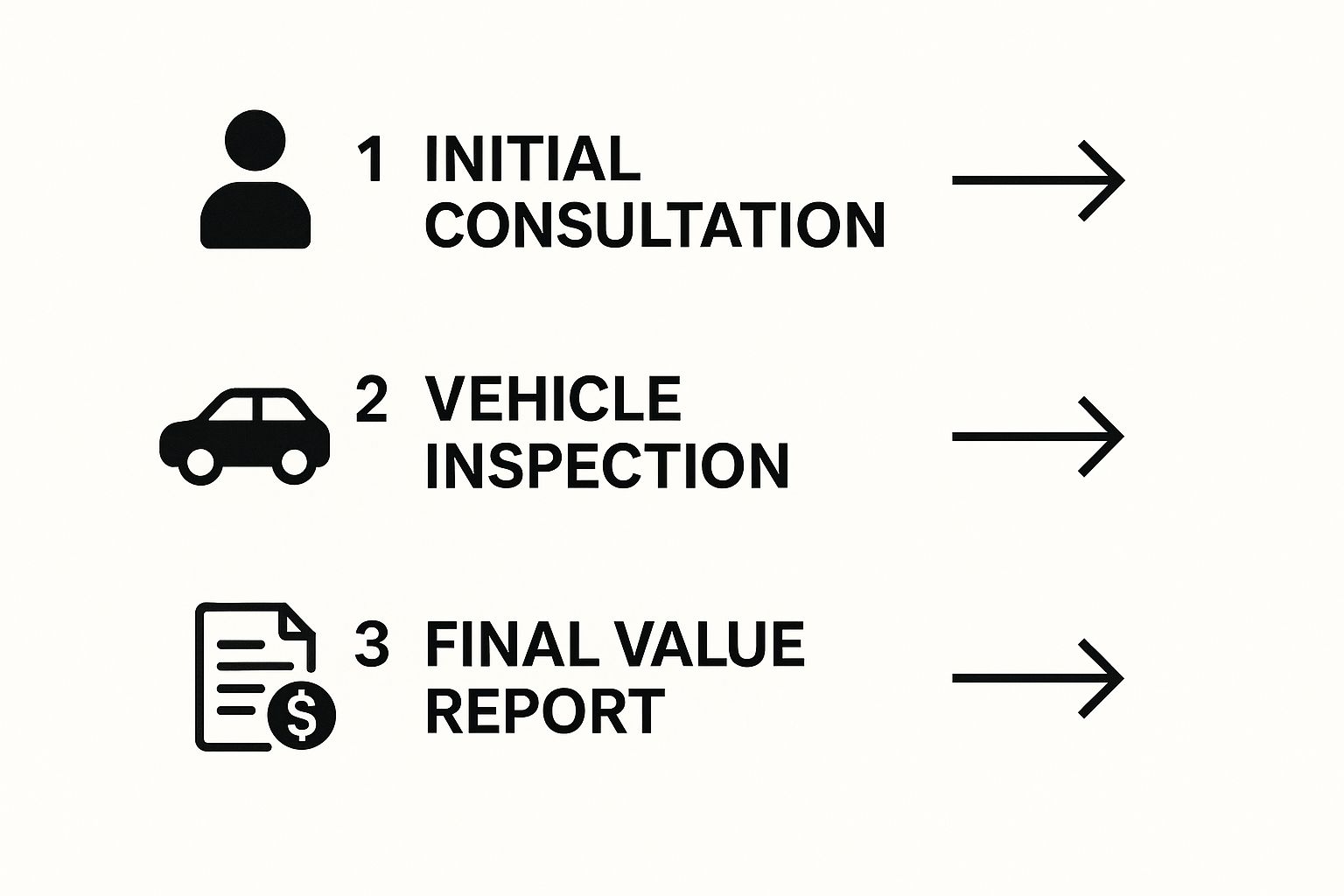Even after flawless repairs, a car accident can shave thousands of dollars off your vehicle's resale value. This hidden financial loss is called diminished value. The only way to prove your claim and get that money back is by getting a professional appraisal from a local expert.
Why You Need a Local Diminished Value Appraisal

Picture this: you're selling your car. A potential buyer runs a vehicle history report and sees a major accident on its record. Even if the car looks and drives like new, you know their offer will be lower than for an identical car with a clean history. That immediate drop in market worth is the problem you're facing.
This isn't just a hypothetical scenario; it's a real, tangible hit to your asset's value. The key concept here is inherent diminished value. This is the automatic loss in a car's market price simply because it now has a damage history. It's all about public perception—the "stigma" that a wrecked-and-repaired vehicle is never quite the same.
Your Strongest Tool Against the Insurance Company
Let’s be honest: insurance companies are in business to minimize payouts. Their first offer for diminished value—if they even make one—will likely come from a generic, internal formula that benefits them, not you. Without your own evidence, you're left with very little negotiating power.
This is precisely where an independent, local appraiser becomes your most critical asset. A free online calculator just won't do the job. You need an expert who lives and breathes your local market—someone who knows exactly what a 2022 Ford F-150 with a documented collision sells for in Portland versus Seattle.
A professional appraisal report isn't just a number; it's meticulously documented evidence. It elevates your claim from a simple request to a well-supported demand backed by hard, real-world data.
A certified local appraiser provides the unbiased, third-party validation you need to effectively counter the insurance adjuster. Their detailed report shows the actual cash value your vehicle has lost, not some figure spit out by a self-serving formula. For a deeper dive into these fundamentals, our guide on understanding diminished value after an accident is a great resource.
The Power of Local Expertise
So, why is "local" so important? It comes down to a few key advantages that can make or break your claim.
- Market-Specific Data: A local pro has their finger on the pulse of your area's auto market. They pull real sales data from local dealerships and private party sales to find the most accurate comparable vehicles.
- Credibility: An appraisal from a recognized expert in your region carries far more weight with local insurance adjusters. They know the appraiser is familiar with the same market they are.
- Physical Inspection: Sometimes, an appraiser needs to see the car in person. This allows them to document any repair-related issues, like subtle paint mismatches or panel gaps, that also contribute to the value loss.
Hiring a local professional is more than just getting a report. You're investing in an advocate who will build an undeniable, evidence-based case for your financial recovery.
For a quick reference, here’s a breakdown of the key concepts.
Diminished Value at a Glance
| Concept | How It Affects You | Why an Appraiser Matters |
|---|---|---|
| Inherent Diminished Value | Your car is worth less money after an accident, even with perfect repairs, due to its damage history. | An appraiser quantifies this loss using local market data, turning a concept into a specific dollar amount you can claim. |
| Repair-Related Value Loss | Lingering issues from the repair, like mismatched paint or poor part fit, further reduce value. | An appraiser can perform a physical inspection to identify and document these flaws as additional evidence. |
| Insurance Company Formulas | Insurers often use biased calculations to offer you the lowest possible settlement for your claim. | An independent appraisal provides an objective, third-party valuation that you can use to negotiate a fair settlement. |
Ultimately, a diminished value claim is a fight you can win, but you need the right evidence to do it. A local appraisal is your best weapon.
Finding a Credible Appraiser in Your Area
When you realize you need a diminished value appraisal near me, your first thought is probably to jump on Google. That’s a decent starting point, but finding an appraiser who will actually get you results takes a little more digging. Think of it less like a quick search and more like vetting a specialist for an important job.
Getting your search terms right is half the battle. Don't just type in "car appraiser." You'll get flooded with generic results. Instead, be specific. Try phrases like "certified auto appraiser for diminished value [Your City]" or "independent vehicle appraisal [Your County]." Using these longer, more detailed searches helps cut through the noise and zero in on experts who actually specialize in diminished value claims.
Beyond Basic Search Tactics
A targeted search is your first step, but the best leads often come from a few old-school, trusted sources. These are the places that professionals trust, and they can give you a solid feel for an appraiser’s reputation before you even make a call.
First, check out the Better Business Bureau (BBB). See if the appraisers on your list have a profile and what their rating is. An A+ rating backed by positive customer reviews is a great sign that you’re dealing with a legitimate professional who cares about their clients.
Another fantastic, and often overlooked, resource is a high-end, independent auto body shop in your area.
Pop in and ask the owner or manager who they recommend for diminished value reports. These folks are on the front lines. They see which appraisers produce reports that insurance companies actually respect and pay out on, and which ones get ignored.
Tapping Into Expert Communities
You can also find some absolute gold in online communities. Niche automotive legal forums or even enthusiast groups dedicated to your specific car brand are often filled with people who have been exactly where you are now.
Look for threads where members are talking about their own diminished value claims. When someone has a successful outcome, they're usually more than happy to share the name of the appraiser who got them there. A recommendation from someone with a real, documented success story is priceless.
By pulling from all these different avenues, you’re not just finding a name—you're building a shortlist of proven experts. To recap, here are the key places to look:
- Targeted Online Searches: Get specific with your search terms, including your city or state.
- The Better Business Bureau (BBB): Focus on accredited businesses with high ratings.
- Trusted Auto Body Shops: Get insider recommendations from repair professionals.
- Automotive Forums and Legal Groups: Find real-world success stories from other car owners.
Ultimately, the goal isn't just to find someone offering a diminished value appraisal near me. It's to find a pro who knows the local market inside and out and has a documented history of successfully getting their clients paid. Putting in this extra effort upfront is what builds the foundation for a strong claim.
How to Vet Your Potential Appraiser

Alright, you've got a list of potential appraisers. Now the real work starts. This is where you separate the true professionals from the folks who just crank out generic, cookie-cutter reports that insurance companies love to ignore.
Don't just look for someone who's available; you need a genuine expert. Your goal is to find an appraiser who crafts ironclad reports that can withstand the intense scrutiny of an insurance adjuster. It means you’ve got to dig a little deeper than their homepage.
Verify Credentials and Specialization
First things first, check their credentials. But don't just get impressed by any old certification. You’re looking for specific, relevant ones from respected organizations like the Independent Appraisers Association (I-AAA). These aren't just fancy letters; they show a commitment to professional standards.
Even more important, though, is their area of focus. A general auto appraisal certification is one thing, but you need a specialist. Diminished value is a very specific niche. It’s a completely different ballgame than appraising a classic car for an auction or a vehicle in a divorce settlement.
Be direct. Ask them point-blank: "What percentage of your appraisal work is focused specifically on diminished value claims?" A real pro will tell you it's their bread and butter, not just some add-on service.
Analyze Their Methodology
This is the most critical part of the vetting process. You absolutely have to understand how they calculate the diminished value figure. A legitimate expert will have no problem walking you through their process. A questionable one will be vague.
The best way to see what you're getting? Ask for a redacted sample report. Don’t be shy about this.
When you get that sample, here's what to look for:
- Real Market Comparables: The report needs to show actual examples of vehicles just like yours (same make, model, year, trim) that recently sold in your local area. It should compare similar cars with clean histories to those with accident histories.
- Specific Data Sources: It should explicitly state where the data came from. Think local dealer sales records, private party listings, and auction results—not just some national database.
- Clear Justification: The report must connect the dots. It needs to logically explain how the market data, the severity of your car’s damage, and its pre-accident condition all lead to their final valuation.
A strong report tells a story with data, making it difficult for an insurance adjuster to dispute. A weak report just provides a number with no substance, which is easy to dismiss.
This report becomes your primary piece of evidence. Once you have it, you’ll be ready to move forward. For a complete walkthrough of the next steps, you can learn more about how to negotiate a diminished value claim in our detailed guide.
Spotting the Red Flags
Knowing what to look for is half the battle; knowing what to avoid is the other half. Certain warning signs should have you running for the hills.
Keep an eye out for these red flags:
- Guaranteed Payouts: This is a huge one. No ethical appraiser can promise you a specific settlement amount. Their job is to provide an accurate, defensible valuation based on evidence, period.
- Reliance on Formulas: If you hear them mention using the "17c formula" or any other generic calculator as their main tool, hang up the phone. These are the same formulas insurance companies use to lowball you.
- Lack of Court Experience: Ask if they've ever been an expert witness or had their reports used in court. An appraiser who has successfully defended their work under oath is one who commands respect and whose reports are taken seriously.
Choosing the right appraiser is the single most important decision you'll make in this entire process. Take your time, do your homework, and hire a true expert who will fight to get you the full value you're legally owed.
Uncovering the Insurance Company's Flawed Math

So, you've filed your diminished value claim. Before long, you'll likely get an offer from the insurance company, complete with a professional-looking report. Don't be fooled. That number isn't based on real-world market data. It's almost always the product of a self-serving formula designed for one purpose: to pay you as little as legally possible.
The most notorious tool in their arsenal is a calculation often called the "17c formula." This is the shady foundation for countless lowball offers I've seen over the years. Once you understand how it's designed to work against you, you'll see why getting your own independent appraisal is so critical.
The Problem with the 17c Formula
The 17c formula starts by putting a hard cap on your claim before any real analysis even begins. It arbitrarily sets the maximum possible diminished value at just 10% of your car's pre-accident value. Right off the bat, if your car was worth $40,000 before the wreck, the formula says your loss can’t possibly be more than $4,000—even if you had major structural damage.
But that's just the start. The formula then chips away at that number with two more penalties.
- Damage Modifier: Your claim gets reduced based on vague damage categories like "moderate" or "severe." These terms rarely capture how potential buyers will actually perceive the damage, especially something serious like a frame repair.
- Mileage Penalty: The formula hammers your payout for every mile on the odometer. This creates a steep and unfair penalty for cars that are simply used for a daily commute.
This whole method is a house of cards because it completely ignores how people buy and sell cars in the real world. The 17c formula is widely criticized for its automatic denial of claims for vehicles over 100,000 miles and its arbitrary 10% cap, both of which are completely disconnected from the actual marketplace. You can get more expert insights on this flawed approach from the pros at AppraisalEngine.com.
A Real-World Example
Let's put this into perspective. Say your two-year-old truck, worth $50,000 with 30,000 miles, gets hit and suffers significant frame damage. The body shop does an amazing job, and it looks perfect.
Using the 17c formula, the insurer caps your loss at $5,000 (10% of $50k). After applying their damage and mileage penalties, their offer comes in at a paltry $2,800.
A professional appraiser throws that bogus math out the window. Instead, they dig into your local market and find concrete proof: identical trucks with accident histories are selling for $7,500 less than ones with a clean title. That $4,700 difference is the money the insurance company was trying to pocket.
This is precisely why you need a pro on your side. The insurer is banking on you accepting a number from a spreadsheet. When you're searching for a diminished value appraisal near me, you're looking for an expert who uses verifiable, local market data. Their report isn't just an opinion—it's documented proof of what real buyers would pay for a car like yours. This evidence is the most powerful tool you have to get the fair settlement you deserve.
The Appraisal Process From Start to Finish
So, you’ve picked a professional to handle your diminished value claim. What happens next? Knowing what to expect can take a lot of the stress out of the process and set you up for success. Let’s walk through the typical journey, from your first phone call to putting that final report to work.
It all starts with an initial consultation. This is where you and the appraiser get on the same page. They'll ask about the accident, the repairs, and your vehicle's details. Have your basic info ready, but don't worry—they'll guide you on exactly what's needed.
Gathering Your Evidence
A strong appraisal hinges on solid proof. Think of yourself as part of the team; your appraiser needs a few key documents from you to build the strongest possible case. This initial legwork is crucial.
Here’s what you’ll likely need to pull together:
- The Final Repair Invoice: This is the big one. It’s a line-by-line account of every part and every minute of labor, painting a clear picture of how serious the damage was.
- Post-Repair Photos: Good, clear pictures of your car after the repairs show the quality of the work and the vehicle's current condition.
- A Vehicle History Report: A report from a service like CarFax or AutoCheck officially documents the accident on your vehicle's permanent record. This is the smoking gun that proves the value has been impacted.
Once you hand over these documents, the real detective work begins for your appraiser. They aren’t just running a formula. They're diving deep into the local market, analyzing recent sales data for vehicles just like yours—some with clean histories, some without. This is how they pinpoint the real, market-driven loss in value.

This simple breakdown shows how an expert moves from the initial fact-finding to delivering the powerful evidence you need.
From Report to Resolution
After the deep-dive analysis, you’ll get the final appraisal report. This document is your ammunition for the negotiation ahead. A truly professional report is thorough and transparent, outlining the appraiser's methodology, listing the comparable vehicles they researched, and stating the diminished value figure in no uncertain terms. It’s built to be persuasive and tough for an insurance adjuster to pick apart.
A professional appraisal isn’t just a number on a page. It's a logical, evidence-based argument backed by verifiable market data. It elevates your claim from a simple request to a formal demand that can’t be easily dismissed.
The final move is yours. You’ll submit this comprehensive report to the at-fault driver's insurance company, usually attached to a short, professional demand letter. Your appraiser has laid out all the facts and done the heavy lifting. Now, it's time to leverage their expertise to get the fair compensation you deserve.
For a clearer picture of what goes into this work, it’s helpful to understand the factors that influence the diminished value appraisal cost. This context shows you why a quality report is a smart investment in your claim's outcome.
Frequently Asked Questions About Diminished Value Claims
Even with all the information in the world, you're bound to have a few questions as you start your diminished value claim. It’s completely normal. Let’s tackle some of the most common ones we hear from vehicle owners, so you can move forward with confidence.
Can I Make a Diminished Value Claim Against My Own Policy?
For the most part, no. A diminished value claim is something you file against the at-fault driver's property damage liability insurance. Your own policy's collision coverage is there to pay for the physical repairs—the parts and labor—not the loss in market value that happens afterward.
There are, of course, a couple of rare exceptions. States like Georgia, for instance, have laws that can open the door to a first-party claim. But for almost everyone else, the claim has to be directed at the other driver's insurer. A certified appraiser who is an expert in your state's specific regulations can give you a definitive answer.
How Much Does a Legitimate Appraisal Cost?
You should plan to invest between $250 and $500 for a high-quality, defensible diminished value report. That price covers the real work involved: detailed local market research, a careful analysis of your vehicle’s damage, and a professionally prepared document that can stand up in negotiations.
Be very cautious of any service offering reports for under $100. Those are almost always just generic, computer-generated estimates. They lack the customized, evidence-based analysis needed to challenge an insurance adjuster, who will likely dismiss it out of hand.
Think of a professional appraisal not as a cost, but as an investment in your claim's success. The detailed evidence it provides is your primary source of leverage, often leading to a final settlement that's many times greater than the appraisal fee.
What If the Insurer Rejects My Appraisal?
First off, don’t panic. This is an incredibly common move and often just the opening gambit in the negotiation process. Insurance companies frequently reject initial submissions as a standard tactic.
Your first step is to push back professionally. Ask the adjuster to provide a written explanation that details their specific objections to your appraisal. A vague response like "we don't agree with your numbers" isn't good enough. They need to point out the flaws they see.
A good appraiser will always stand by their work and will help you draft a point-by-point rebuttal to the insurer's arguments. If the company still won't negotiate fairly, you can escalate by filing a complaint with your state's Department of Insurance or speaking with an attorney. In either case, your appraisal is the crucial piece of evidence you'll need.
Is a Claim Worth It for an Older Car?
It absolutely can be. While it's true that newer, low-mileage vehicles suffer the biggest dollar drop, older cars that were in great shape before the wreck also lose real-world value. Insurers love to use arbitrary cutoffs—like the 100,000-mile rule in the flawed 17c formula—to deny these claims automatically.
But those are their rules, not market reality. A well-maintained older truck, a sought-after SUV, or a classic car has a strong market value that gets damaged by a collision history. A professional appraiser ignores the insurance company’s self-serving formulas and analyzes your specific vehicle's standing in the actual marketplace. More often than not, a claim is well worth pursuing.
If you’ve been in an accident and believe your vehicle’s value has taken a hit, don’t let the insurance company have the final say. The team at Total Loss Northwest specializes in providing certified, evidence-based diminished value appraisals for owners in Oregon, Washington, and nationwide. We’re here to help you get the fair value you’re rightfully owed. Get your expert appraisal today.





